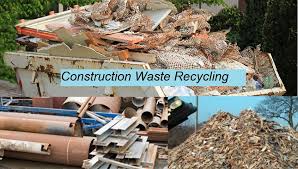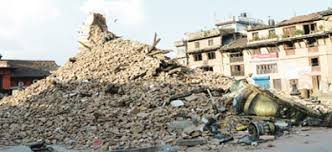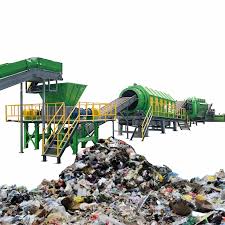![]()
If you’ve landed on this article page, you’re probably searching for a
good business idea—an idea that’s light on the pocket but heavy on
returns, promising both a fulfilling journey and potential profit.
|
How To Start A Construction Waste Recycling Business in Nigeria
The Construction Waste Recycling Business in Nigeria and Africa
is a vital endeavor aimed at addressing the mounting
environmental challenges associated with construction
activities. The construction industry generates a substantial
amount of waste, including materials like concrete, wood, metal,
and plastics.
A Construction Waste Recycling Business involves the collection,
sorting, processing, and reusing of waste materials generated
from construction projects. This business aims to reduce the
environmental impact of construction activities by diverting
waste from landfills and promoting resource conservation.
The production yield from raw materials largely depends on the
efficiency of the recycling process and the quality of recovered
materials. Recycled construction waste can be transformed into
various useful products, such as aggregates for concrete,
bricks, or even new construction materials.
Uses Of Recycled Construction Waste In Nigeria and Africa
1. Aggregate Production: Recycled construction waste can be
crushed and processed into aggregates that can be used in
concrete, asphalt, and road construction.
2. Road Base Material: Processed construction waste can be used
as a base material for road construction and repair, reducing
the need for virgin materials.
3. Building Blocks and Bricks: Recycled materials can be
incorporated into the production of bricks and building blocks,
reducing the demand for traditional clay-based products.
4. Insulation Materials: Some recycled construction waste, such
as shredded paper, can be repurposed as insulation material for
buildings.
5. Eco-Friendly Roofing Materials: Recycled rubber and plastic
materials can be used to create roofing tiles that are durable
and eco-friendly.
6. Paving Stones: Recycled concrete and asphalt can be used to
create paving stones and tiles for pathways and outdoor spaces.
7. Landscaping: Crushed concrete and other recycled materials
can be used for landscaping projects, such as creating retaining
walls and decorative elements.
8. Soil Amendment: Composted organic construction waste can be
used as a soil amendment to improve soil fertility and
structure.
9. Art and Decor: Reclaimed wood, metal, and other materials can
be used in artistic and decorative applications.
10. Furniture and Decor: Recycled materials can be used to
create unique furniture pieces and interior decor items.
11. Drainage Systems: Crushed concrete and stone can be used in
the construction of drainage systems to manage rainwater runoff.
12. Erosion Control: Recycled materials can be used to create
erosion control measures, such as gabion walls and slope
stabilization.
13. Sound Barriers: Recycled materials can be used to construct
sound barriers along highways and busy urban areas.
14. Water Filtration: Some construction waste materials can be
repurposed for water filtration systems in rural and remote
areas.
15. Green Roof Substrate: Recycled materials can be used as a
substrate for green roofs, contributing to urban sustainability.
Business Opportunities In The Construction Waste Recycling
Business In Nigeria
1. Material Recovery and Resale: Collect and sort valuable
construction materials, such as metals, wood, and aggregates,
for resale to construction companies, generating revenue.
2. On-Site Recycling Services: Offer on-site recycling services
to construction projects, reducing waste disposal costs for
contractors and promoting sustainable construction practices.
3. Waste Collection and Transportation: Provide waste collection
and transportation services to construction sites, ensuring
proper disposal and recycling of construction waste.
4. Recycling Facility Operation: Establish and operate recycling
facilities where construction waste is sorted, processed, and
prepared for resale or reuse.
5. Product Manufacturing: Repurpose recycled construction
materials into new products, such as reclaimed wood furniture,
recycled glass countertops, or recycled concrete pavers.
6. Consulting and Advisory Services: Offer expertise to
construction companies on implementing effective waste
management and recycling practices to meet sustainability goals.
7. Equipment Rental: Rent out recycling equipment like crushers,
shredders, and compactors to construction sites for on-site
processing of waste materials.
8. Green Building Certification: Assist construction companies
in achieving green building certifications by providing waste
diversion strategies and documentation.
9. Public Awareness and Education: Raise awareness about the
benefits of construction waste recycling through workshops,
seminars, and educational campaigns.
10. Waste Audit and Management Plans: Offer waste audit services
to construction projects, helping them develop customized waste
management plans for optimal recycling.
11. Technology Solutions: Develop software or apps for tracking
and managing construction waste, providing real-time data on
waste generation and recycling rates.
12. Green Construction Supplies: Supply eco-friendly
construction materials made from recycled content, attracting
environmentally conscious builders.
13. Construction Debris Removal: Specialize in the safe and
efficient removal of construction debris, ensuring compliance
with waste disposal regulations.
14. Research and Development: Invest in research to develop
innovative techniques for recycling challenging construction
materials like asphalt, concrete, and gypsum.
15. Community Engagement Programs: Partner with local
communities to initiate construction waste recycling
initiatives, creating goodwill and fostering a sustainable
reputation.
Types Of Construction Waste Recycling Businesses In Nigeria
1. Aggregates Production: This type focuses on recycling
concrete and asphalt rubble into aggregates for new construction
projects, reducing the need for virgin materials.
2. Brick and Block Manufacturing: Recycling concrete and clay
bricks and blocks into new construction materials, minimizing
the environmental impact of traditional brick production.
3. Wood Recycling: Businesses involved in wood recycling salvage
and process construction wood waste, creating reusable lumber or
wood-based products.
4. Metal Recycling: These businesses recover metals such as
steel, aluminum, and copper from construction waste, selling
them to manufacturers for new products.
5. Plastic Recycling: Processing plastic waste from construction
sites into reusable plastic products or raw materials for
manufacturing.
6. Glass Recycling: Recycling glass from windows and other
construction materials for use in new glass products or other
applications.
7. Roofing Material Recycling: Recovering and reprocessing
roofing materials like asphalt shingles for use in new roofing
projects.
8. Insulation and Drywall Recycling: Recycling insulation
materials and drywall from construction sites to create new
insulation products.
9. Demolition Waste Management: Specializing in the
deconstruction and careful dismantling of structures to salvage
materials for reuse or recycling.
10. Salvage Yards: Businesses that collect, sort, and sell
salvaged construction materials to contractors and individuals
for reuse.
11. Green Building Materials Suppliers: Providing recycled
construction materials for green building projects and
eco-conscious developers.
12. Waste Management Consultancy: Offering expertise in waste
management planning, compliance, and sustainable practices for
construction companies.
13. Equipment Rental and Sales: Supplying construction companies
with equipment for on-site waste sorting, processing, and
recycling.
14. Site Clean-Up Services: Specializing in post-construction
site clean-up, waste sorting, and recycling.
15. Green Building Certification Support: Providing services to
help construction companies achieve green building
certifications by implementing effective waste management and
recycling strategies.
How To Start The
Construction Waste Recycling Business In Nigeria
1. Research and Planning: Conduct thorough research on the
construction waste recycling industry in Nigeria and Africa.
Understand local regulations, market demand, potential
competitors, and available resources. Develop a comprehensive
business plan outlining your goals, target market, recycling
methods, and financial projections.
2. Legal and Regulatory Compliance: Register your business,
obtain necessary licenses, and comply with environmental
regulations for waste recycling. In Nigeria, this may involve
registration with the Corporate Affairs Commission (CAC) and
obtaining permits from relevant agencies.
3. Site Selection and Infrastructure: Choose a suitable location
for your recycling facility. Consider proximity to construction
sites, access to transportation, and availability of utilities.
Set up the necessary infrastructure, including sorting and
processing equipment, storage facilities, and office space.
4. Procurement of Equipment: Acquire the required recycling
equipment, such as shredders, crushers, conveyors, and sorting
machines. Ensure the machinery is efficient and complies with
safety standards.
5. Raw Material Collection: Establish a network to collect
construction waste materials from building sites, contractors,
and demolition projects. Develop partnerships with construction
companies and waste collection agencies to ensure a steady
supply of raw materials.
6. Sorting and Segregation: Implement a systematic process to
sort and segregate different types of construction waste, such
as concrete, wood, metal, and plastics. Proper sorting is
crucial for efficient recycling.
7. Recycling Process: Choose appropriate recycling methods based
on the types of waste materials. This may involve crushing
concrete to produce aggregate, shredding wood for biomass, and
melting metals for reuse.
8. Quality Control: Implement quality control measures to ensure
the recycled materials meet industry standards and
specifications.
9. Marketing and Sales: Develop a marketing strategy to promote
your recycled construction materials to potential buyers,
including construction companies, contractors, and government
agencies. Highlight the environmental benefits and cost savings
of using recycled materials.
10. Logistics and Distribution: Establish a distribution network
to deliver recycled materials to customers. Ensure efficient
transportation and timely delivery.
11. Employee Training: Train your workforce on proper recycling
techniques, equipment operation, and safety protocols.
12. Sustainability and Innovation: Continuously explore
innovative recycling methods and technologies to improve
efficiency and reduce waste.
13. Partnerships and Collaborations: Collaborate with other
businesses, NGOs, and government agencies to enhance your
recycling efforts and expand your reach.
14. Financial Management: Maintain accurate financial records,
monitor expenses, and ensure a sustainable pricing strategy for
your recycled materials.
15. Environmental Impact: Regularly assess and report the
environmental impact of your recycling operations. Implement
measures to minimize waste and promote sustainable practices.
Types Of Construction Waste Recycling Methods In Nigeria and
Africa
1. Mechanical Recycling: Mechanical recycling involves
physically processing construction waste materials to create new
products. Concrete can be crushed into aggregate for road
construction, while metals and plastics can be shredded and
melted for reuse in new structures.
2. Concrete Reclamation: This method involves breaking down and
treating concrete waste to recover aggregates, cement, and sand,
which can be used in new concrete production.
3. Asphalt Recycling: Old asphalt pavement can be recycled and
used to produce new asphalt mixtures for road construction and
repair.
4. Wood Recycling: Wood from construction waste can be chipped,
shredded, or processed into wood chips, mulch, or biomass fuel.
5. Metal Recycling: Scrap metals from construction sites can be
sorted, melted, and reformed into new metal products or used as
raw material in manufacturing.
6. Plastic Recycling: Plastics from construction waste can be
cleaned, processed, and transformed into new plastic products or
construction materials.
7. Reuse and Repurposing: Salvaging intact materials from
construction sites, such as doors, windows, and fixtures, for
reuse in other projects.
8. Green Building Materials: Repurposing construction waste
materials to create eco-friendly building materials, like
recycled glass countertops or reclaimed wood flooring.
9. On-Site Recycling: Implementing recycling systems directly at
construction sites to sort, process, and reuse materials.
10. Prefabricated Building Components: Using recycled
construction materials to create prefabricated building
components for faster and more sustainable construction.
11. Construction Waste-to-Energy: Converting non-recyclable
construction waste into energy through incineration or
gasification.
12. Road Base and Fill Material: Recycling construction waste
materials for road base or fill material in road construction
projects.
13. Reinforcement Bar Recovery: Recovering steel reinforcement
bars from concrete waste for reuse in new construction projects.
14. Gypsum Recycling: Separating gypsum from drywall waste and
recycling it for use in new drywall production or agricultural
applications.
15. Building Deconstruction: Carefully dismantling buildings to
salvage valuable materials for reuse, reducing waste and
environmental impact.
How To Recycle and Package Construction Waste In Nigeria
1. Site Assessment and Waste Identification: Conduct a thorough
assessment of the construction site to identify the types of
waste generated, including concrete, wood, metal, plastics, and
other materials.
2. Waste Segregation: Implement a proper waste segregation
system to separate different types of construction waste at the
source. Use designated bins for concrete, wood, metal, plastics,
and other materials.
3. Collection and Transportation: Arrange for the collection and
transportation of segregated construction waste to a recycling
facility. Ensure proper handling and transportation practices to
prevent contamination.
4. Recycling Facility Setup: Establish a recycling facility
equipped with the necessary machinery and equipment for
processing different types of construction waste. This may
include crushers, shredders, separators, and balers.
5. Material Processing: Process the collected construction waste
materials according to their type. Crush concrete into
aggregate, shred wood into chips, melt metals for reuse, and
clean plastics for recycling.
6. Quality Control: Implement quality control measures to ensure
that recycled materials meet industry standards and can be
safely used in new construction projects.
7. Production of Recycled Products: Produce recycled
construction materials such as recycled concrete aggregate,
reclaimed wood products, recycled metal, and recycled plastic
materials.
8. Marketing and Sales: Develop a marketing strategy to promote
your recycled construction materials to builders, contractors,
and developers. Highlight the environmental benefits and cost
savings.
9. Collaborate with Industry Partners: Build partnerships with
construction companies, architects, and designers to create
demand for your recycled materials in their projects.
10. Regulatory Compliance: Ensure compliance with environmental
regulations and waste management standards in Nigeria and
Africa. Obtain necessary permits and approvals.
11. Public Awareness and Education: Educate the public,
construction industry, and local communities about the benefits
of construction waste recycling and the availability of recycled
materials.
12. Training and Skill Development: Train your workforce in
proper recycling techniques, safety measures, and equipment
operation to optimize the recycling process.
13. Monitoring and Reporting: Implement a monitoring system to
track the recycling process, material quantities, and
environmental impact. Regularly report on your recycling efforts
and achievements.
14. Research and Innovation: Stay updated on the latest
technologies and innovations in construction waste recycling to
improve efficiency and expand your product offerings.
15. Continuous Improvement: Continuously assess and improve your
recycling processes, explore new markets, and seek opportunities
for growth and expansion.
Types Of Equipment & Tools Used In The Construction Waste
Recycling Business In Nigeria or Africa
1. Mobile Crushers: These machines crush large pieces of
construction waste into smaller sizes, making it easier to
transport and recycle.
2. Concrete Pulverizers: Used to crush concrete into gravel-like
materials, which can be reused as aggregates in new construction
projects.
3. Magnetic Separators: Separate ferrous metals (like steel)
from construction waste, allowing for easier recycling of
metals.
4. Vibratory Screens: These screens sort and separate
construction waste by size, enabling efficient processing.
5. Trommel Screens: Used to screen and sort different sizes of
construction waste, helping to separate valuable materials for
recycling.
6. Shredders: Shred wood, plastics, and other materials into
smaller pieces, facilitating recycling and reducing volume.
7. Conveyor Belts: Transport materials within recycling
facilities, making the process more streamlined.
8. Balers: Compact recyclable materials like cardboard,
plastics, and metals into bales for easier storage and
transportation.
9. Compactors: Compress construction waste, reducing its volume
and making it more manageable for transportation.
10. Dust Collectors: Ensure a clean working environment by
collecting dust and debris from the recycling process.
11. Waste Separation Systems: Automated systems that use
conveyor belts, screens, and sensors to separate different types
of construction waste.
12. Packaging Equipment: Machines that package recycled
materials in appropriate containers for transport and storage.
13. Forklifts and Skid Steers: Used for moving and transporting
heavy construction waste materials within the recycling
facility.
14. Waste Collection Trucks: Vehicles equipped to collect and
transport construction waste from various sources to the
recycling facility.
15. Weighing Scales: Essential for accurately measuring and
recording the weight of recycled materials, facilitating proper
accounting and reporting.
The Construction Waste Recycling business in Nigeria holds
immense potential for addressing environmental concerns,
promoting sustainable development, and contributing to economic
growth.
However, the journey is not without its challenges. As
highlighted in this comprehensive exploration, the industry
faces obstacles ranging from regulatory complexities and lack of
awareness to technological constraints and limited market demand
for recycled products. Overcoming these challenges requires
collaborative efforts from governments, industry players, and
communities to develop effective waste management strategies,
enhance recycling infrastructure, and foster a culture of
sustainable practices.
|







